Search results for "Aseguranzas para autos Pompano Beach FL llama ahora al 888-430-8975 Calcular valor de seguro automotor Buscador seguros auto La caja de seguros automotor Asegurar mi auto online Seguro basico para auto Corredor de seguros"
The Sleepwalker
31 March 1984 | Archives online, Drama, Fiction
We print here an extract from the radio play Somngångerskan (‘The sleepwalker’, 1978). Walentin Chorell himself said that he felt this genre to be the closest to his heart, and his radio plays are perhaps the element of his work that has contributed most to his reputation in Finland and in the rest of Europe.
As the play begins, we sense night in the old, rambling log house, with a clock ticking in the background; the sound comes closer, intensifies, and then dies away again. The clock strikes three; its works are old and complaining. Long silence.
Then the silence is broken by the loud and happy laughter of Jerine, the sleepwalker. A flock of gulls is heard calling over the beach; there is a gentle summer breeze, and the waves are lapping against the boulders on the shore.
FIRST VOICE (=the mother, frightened)
What’s wrong? What have you wakened me up for?
SECOND VOICE (=the father)
It’s Jerine. She was laughing in her sleep. More…
The Earth is a snowball
31 March 1995 | Archives online, Prose
A short story from Resa runt solen (‘Journey round the sun’, Schildts, 1994). Introduction by Ann-Christine Snickars
It is a day in August and even though I can sense that the end of the summer is nearer than the beginning, my hours are still as long as days. I am a child and live in the midst of summer’s eternity.
This morning I wake up earlier than anyone else. It isn’t usually that way. Usually Mårten is the first of us two to get up, but now he is asleep with his face turned to the wall. I stay in bed for a while, listening. It is also quiet in the other room, where Mama is asleep. Now I remember that it’s today Papa is coming out to see us after working in the town all week.
I open the curtain a little and see that the sky is blue and not grey with heavy rainclouds as it has been these past few days. I quickly put on my few clothes, a thin striped cotton sweater, my shorts and my brown plimsolls. I push the door open, stand on the steps and breathe a morning air that still smells more of summer than of autumn. I listen to the familiar sounds: twittering birds, the wind in the treetops and crying gulls over the bay. More…
The summer of 1965
30 June 1995 | Archives online, Fiction, Prose
From Underbara kvinnor vid vatten (‘Wonderful Women by the Sea’, Söderströms, 1994; Finnish translation lhanat naiset rannalla, Otava, 1995). Introduction by Michel Ekman
The summer of 1965; this summer people go waterskiing. They go waterskiing behind the Lindberghs’ shining mahogany sportsboat, and from midsummer onwards they go water-skiing behind Gabbe’s outboard motorboat, an Evinrude bought second-hand from Robin Lindbergh. Now Bella and Rosa are skiing: Tupsu Lindbergh’s face is covered in freckles if you look at her close to, and it’s not particularly becoming, her fair hair is super-peroxided and she is as thin as a skeleton and everyone knows that it’s because she is so thin and ugly and not because she has a cold that she says she can’t take part in any watersports. There is something nervous about Tupsu Lindbergh. At Bella’s party at the beginning of the summer Tupsu Lindbergh sits on the white villa’s veranda, on the white villa’s lawn on a camping chair, on the white villa’s beach while Bella and Rosa go waterskiing and talk about Tupperware. Not Tupperware all the time, but Tupperware is the collective description. More…
Online, offline?
17 April 2014 | Articles, Non-fiction
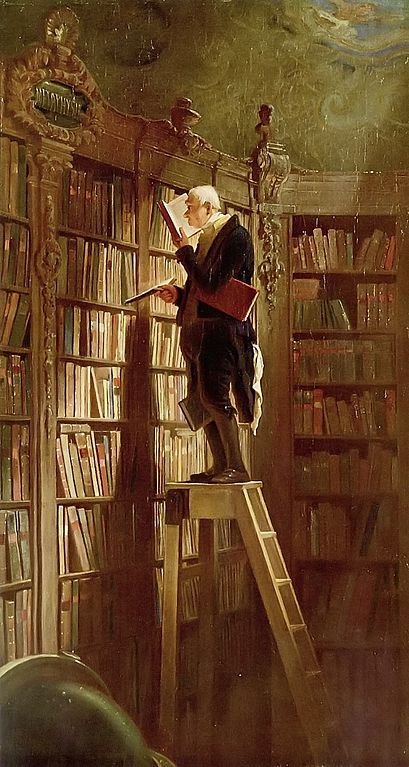
‘The bookworm’ (old-fashioned) by Carl Spitzweg, ca. 1850. Museum Georg Schäfer. Photo: Wikimedia
Ebooks are not books, says Teemu Manninen, and publishers who do not know what marketing them is about, may eventually find they are not publishers any more
At least once a year, there is an article in a major Finnish newspaper that asks: ‘So, what about the ebook?’ The answer is, as always: ‘Nothing much.’
It’s true. The revolution still hasn’t arrived, the future still isn’t here, the publishers still aren’t making money. In Finland, the ebook doesn’t seem to thrive. The sales have stagnated, and large bookstores like the Academic Bookstore are closing their ebook services due to a lack of customers.
Why is Finland such a backwater? Why don’t Finns buy ebooks?
The usual explanation is that Finland is a small country with a weird language, so the large ebook platforms like Amazon’s Kindle and Apple’s iBook store have not taken off here. Another patsy we can all easily blame is the government, which has placed a high 24% sales tax on the ebook. If that isn’t enough, we can always point a finger at the lack of devices and applications or whatever technical difficulty we can think of. More…
Melba, Mallinen and me
30 June 1993 | Archives online, Fiction, Prose
From Fallet Bruus (‘The Bruus case’, Söderströms, 1992; in Finnish, Tapaus Bruus, Otava), a collection of short stories
After the war Helsingfors began to grow in earnest.
Construction started in Mejlans [Meilahti] and Brunakärr [Ruskeasuo]. People who moved there wondered if all the stone in the country had been damaged by the bombing or if all the competent builders had been killed; if you hammered a nail into a wall you were liable to hammer it right into the back of your neighbor’s head and risk getting indicted for manslaughter.
Then the Olympic Village in Kottby [Käpylä] was built, and for a few weeks in the summer of 1952 this area of wood-frame houses became a legitimate part of the city that housed such luminaries as the long-legged hop-skip-and-jump champion Da Silva, the runner Emil Zatopek (with the heavily wobbling head), the huge heavyweight boxer Ed Saunders and the somewhat smaller heavyweight Ingemar Johansson who had to run for his life from Saunders. More…
Ordinary people
30 June 1990 | Archives online, Fiction, poetry
Poems from Vaikka aamuun on vielä aikaa (‘Though it’s still a long time till morning’, 1989) Introduction by Risto Rasa
This time
this time of consensus
that teaches
the poor to love the prosperous,
the bossed to love the bossers
the kicked to love the kickers
and all of us to love humility
obedience and biddability
before the hingdom, the power and the glory:
this time
cries out for a tearer-up,
calls for a muster
of thousands and thousands
of serious and honest busters. More...
Decisions, decisions: the fate of virtual literature
28 November 2013 | Articles, Non-fiction
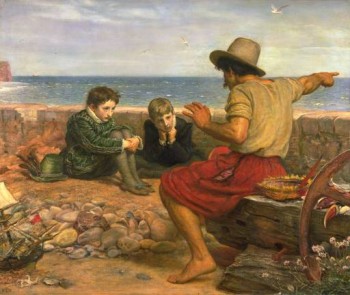
Once upon a time: ‘Boyhood of Raleigh’ by J.E. Millais (1871). Wikipedia
In an era of ‘liveblogging’‚ we are all storytellers. But what’s the story, asks Teemu Manninen
One score of years ago, when the internet was new, the cultural critics of the time were fond saying that it would usher in a new utopia of free distribution of information: we would be able to read everything, know everything and share everything anywhere and every day.
Truly, they told us, we would become enriched by the internet to the point of not knowing what to do with all that wealth of knowledge, the amount of connections between us and the ever-increasing online availability of anyone with everyone, every waking hour.
Now that we really do have this always-on connectivity, you will indeed be available every waking hour: you will update your status, check your inbox, post pics and be available for chatting, texting, a quick email and a message or two, just to make sure no one is offended by your unreachability, since – from experience – a week’s worth of not tweeting or facebooking can make someone think that something serious has happened, or that you don’t even exist anymore. More…
Letters to Trinidad
31 March 1990 | Archives online, Fiction, Prose
Extracts from the novel Kirjeitä Trinidadiin (‘Letters to Trinidad’, 1989). Introduction by Suvi Ahola
Elisabet suggested that they should go to the beach. Seppo would have liked to show her the coral, but his wife thought it was too far, and so they decided to go to the beach nearest the hotel.
They hired mattresses and a sun umbrella and found places in the first row, close to the water. The sea glittered, and long, shallow waves rolled towards the sand, like long, even snores. Seppo dozed for a moment, then sat up and, taking his binoculars, focused out to sea. Two warships sailed eastwards through the glittering waves. Egypt, Jordan and the Arab countries all around, Iran and Iraq close by, Libya not far away – it was like lying on a keg of gunpowder!
Elisabet went swimming, and he followed. He carried his wife through the waves, played the life-saver and dragged Elisabet’s apparently lifeless body through the waves. They dived, and Elizabet complained that the salt stung her eyes. They lay on their mattresses and when Seppo glanced at her, he felt again the sharp stab of desire, and would have liked to make love, but had to content himself with caressing her thigh. When his desire became too great he covered himself with a rowel, and Elisabet laughed.
‘Again? You’re insatiable’, she said. More…
Moomins on the beach
23 April 2015 | This 'n' that
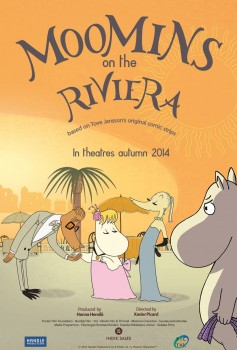 A new, Finnish-French, animated movie sees the Moomin family caught up in a typhoon that lands them among the fleshpots of the French Riviera.
A new, Finnish-French, animated movie sees the Moomin family caught up in a typhoon that lands them among the fleshpots of the French Riviera.
Based not on Tove Jansson’s children’s books, but on a cartoon strip drawn by Tove and her brother, Lars, that ran in the London Evening Standard newspaper between 1954 and 1970, Moomins on the Riviera offers the Moomins a whole host of new experiences.
The plot draws the experiences of Tove and her mother on holiday in the south of France. The bedraggled family takes up residence in the royal suite of the Grand Hotel, where they are initially quite unaware that they will have to pay for the privilege. Moominpappa makes friends with the aristocratic Marquis de Mongaga and affects the surname ‘de Moomin’; the Snorkmaiden, meanwhile, is dazzled by the charms of a playboy by the name of Clark Tresco. Overwhelmed – and worried about how the family can stick together in the face of all these new experiences – Moomintroll and Moominmamma decide to move to the beach, and seek shelter under their shipwrecked boat.
The trailer for the film, which is a co-production between Handle Productions of Finland Pictak of France, shows a hand-drawn animation style which stays very close to Tove Jansson’s original drawings – something which will delight the many Moomin fans who were horrified by the cute, balloon-like characters in the popular Japanese TV animation.
The film’s director is Xavier Picard, and its producer and co-director Hanna Hemilä. It opens in London on 22 May.
Grown-up talk
13 June 2013 | Non-fiction, Tales of a journalist

Illustration: Joonas Väänänen
Would you say this to someone face to face? No? But anonymously, in writing, you do. Columnist Jyrki Lehtola takes a look at the way Finns tend to behave on the Internet
Babies. They’re cute. They have to be – they are babies after all. And their parents are lovely people, because they have those cute babies. Even they have a hard time believing how mellow and happy they are now that they have a baby.
But what happens to parents when the baby falls asleep and they get to creep off to the Internet? They completely freak out and turn into belligerent trolls. More…
Troubled waters
31 March 2005 | Archives online, Fiction, Prose
Extracts from the novel Den amerikanska flickan (‘The American girl’, Söderströms, 2004). Introduction by Pia Ingström
Doris Night&Sandra Day, Sandra Night&Doris Day: those were their alter ego identities for the game, which also involved the smiles they’d practised in front of the mirror at the bottom of the empty swimming pool, in the house in the muddier part of the woods.
‘We’re two clairvoyant sisters,’ said Doris Flinkenberg. ‘We got that way because of tragic circumstances. The poltergeist phenomenon. Do you know what that is?’
Sandra Wärn shook her head, but looked expectantly at Doris, the perennial crossword – solver, with dictionary to hand, who continued. ‘It’s when the innocent child has been badly abused and has developed supernatural powers in order to survive. Powers to see behind what’s there,’ Doris Flinkenberg explained. ‘To see what no one else can see.’
‘You and I, Sandra,’ Doris confirmed. ‘We were badly abused. I with my scars and you with your tragic family background, your mother and her lover, all of that. You and I, Sandra, we know what it is to suffer.’ More…
Happy birthday to us!
13 February 2014 | Letter from the Editors

Picture: Wikipedia
It’s been five years since Books from Finland went online, and we’re celebrating with a little bit of good news.
In the past year, the number of visits to the Books from Finland website has grown by 11 per cent. The number of US and UK readers grew by 29 per cent, while the number of readers in Germany – stimulated perhaps by the publicity Finnish literature is attracting as a result of its Guest Country status at this year’s Frankfurt Book Fair – increased by an astonishing 59 per cent.
We’re chuffed, to put it mildly – and very thankful to you, dear readers, old and new. More…
Art online
23 May 2013 | In the news
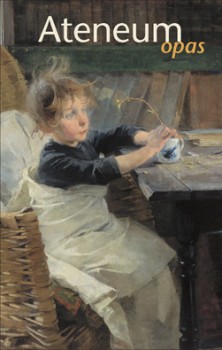
Helene Schjerfbeck’s The convalescent (1888) on the cover of the guidebook of the Ateneum Art Museum
Attention lovers of Finnish art: the Ateneum Art Museum in Helsinki has joined the international Google Art Project (begun in 2011), with 260 participating art institutes and more than 40,000 works of art as high-resolution images.
The website also includes information on the paintings. Among the 55 images from Ateneum on show now are many of the great works of the golden period of Finnish art (1880–1910), including Hugo Simberg’s darkly cute The Garden of Death, Albert Edelfelt’s heartbreakingly beautiful Conveying a Child’s Coffin, Akseli Gallen-Kallela’s classic portrayal of grief, Lemminkäinen’s mother, and – a personal favourite here at the Books from Finland office – Magnus von Wright’s evocative Annankatu Street on a Cold Winter’s Morning.
The Ateneum has few foreign works of art; in the Google Art collection now there are one Rodin, a Modigliani, a van Gogh and two Gauguins.
One hell of a time
31 December 1997 | Archives online, Fiction, Prose
Extracts from Lanthandlerskans son (‘Country shopkeeper’s son’, Söderströms, 1997). Brooklyn Bridge, Christmas Eve: Otto, a Finland-Swede, attempts to start a new life in 1930s America, where swindlers and even gangsters can, he finds, be duped – even Al Capone. Otto’s grandson listens to his story on tape
I have always loved that sight. A city that you see from the air at night, all lit up. It’s’ beautiful – and at the same time so frightening. I don’t really know how to describe it.
Well, it was Christmas Eve. I was wandering around New York. I had eaten at an automat. Do you know what that is? They don’t exist any more, but in the Twenties and Thirties they were common in America. It’s a cafe, but they didn’t have any staff or waiters, instead the walls were full of little glass boxes where the food was on display. You could select what you wanted – sandwiches and pies and salads, anything. Then you put your nickels and dimes in a slot beside the box and the glass opened and’all you had to do was take out the plate. I was fond of the automats. I liked just sitting there and watching other people eat, no one bothered about you, you were left alone and that suited me. When I’d finished eating I went outside again and somehow or other I wandered upon to Brooklyn Bridge. There was a lot of traffic, people were on their way home. Well, just as I was walking there alone in the company of my thoughts I heard someone shouting ‘Help! Help me!’ More…
Art Deco / ja taiteet / i konsten / and the arts
6 June 2013 | Mini reviews, Reviews
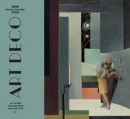 Scientific editor: Laura Gutman
Scientific editor: Laura Gutman
Editor: Susanna Luojus
Helsinki: Suomalaisen Kirjallisuuden Seura (the Finnish Literature Society), 2013. 179 p., ill.
Texts in Finnish and Swedish, summaries in English
ISBN 978-952-222-430-9
€38, hardback
This work was published simultaneously with the opening of the exhibition ‘Art Déco and the Arts. France–Finlande 1905–1935’, running at the Amos Anderson Art Museum in Helsinki from March to 21 July. Antiquity was the primary source of inspiration for this broad artistic movement in France, after the breakthrough of Fauvism in 1905. In Finland this antimodern – and yet at the same very modern – movement manifested itself most clearly in industrial art, in the 1920s in classicism and 1930s in functionalism. But from early on, Finnish painters and sculptors also kept an eye on the French art and artists – among them Maurice Denis, the spokesman of the antimodernists. The dialogue between the visual and the performative arts (theatre and dance) in Finland is also examined. Samples of Art Deco architecture are mostly absent, as the emphasis is on painting and sculpture. Some less well-known artists of the period (painter Nikolai Kaario, sculptor and engraver Eva Gyldén) are introduced. The exhibition and the richly illustrated book introduce both Finnish and French works – from many museums and collections in France – of both industrial and fine arts, in pictures and in words by nine specialists, offering the reader fresh and interesting comparisons.
